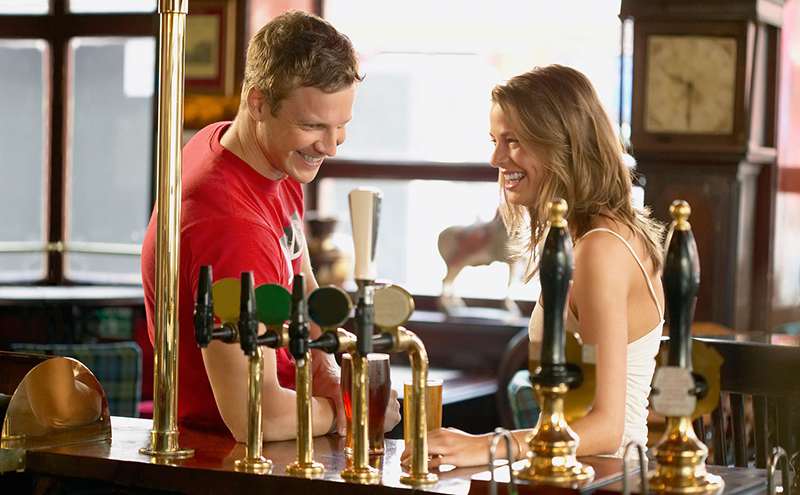
Interaction Over Introversion Every Time
Ok. Up until now we’ve been working on mindset and what has been popularly called ‘inner game.’ I’ve given you as much handholding and kid gloves as you need. It’s time to put some skin in the game.
I’ll do my best to give you some training wheels and make it really easy to get used to pedaling before we take them off. In fact, let me start with a little story.
My twin brother has two girls. They are a perfect case study of Introverted vs. Extroverted, and oldest child vs. youngest child.
My brother tells me something the oldest said to him when he made some jokes with a random person one day.
“Daddy. How do you just talk to someone?”
Well, for her, and for you, I’m here to tell you something that may be difficult to accept – depending on what you consider your identity.
Introversion Has No Place in a Social Situation.

I know what you’re thinking: “Is there any situation where Introversion gives me an advantage?”
I could play Devil’s-Advocate-and argue that analysis and problem solving might blah blah blah, but you know what? That doesn’t matter here, because what I am certain about is that Introversion has no place in a social situation or interaction.
A social situation has more than one person by definition. The other person – or people – cannot see inside your head, so immediately when you retreat to your inner workings, you are leaving the scene. That may be comfortable for you, but since you are in a social situation, you are wasting your opportunity.
Why is it comfortable for you? Like smoking an extra cigarette, or drinking your sixth vodka, or sleeping in when you have a difficult exam, or showering for two hours, often the most comfortable, most desirable course of action is in no way wise.
Comfort is often the result, cause and reinforcement of habit. Often the thing that feels most “comfortable” is only so because it is easy, or you’re used to doing it. Comfort is no indicator of right.
How are you wasting your opportunity? This may be difficult for you to grasp, but hopefully you will grasp it and hopefully you will henceforth make the most of this opportunity.
People are Valuable.
Think of all the things you need people to do.
Almost everything you like requires people. Of course many things (a hike, a walk in the woods, a bubble bath, sleep) do not require people (forgetting for a moment the hiking boots and rangers and path-makers and tub builders and utility companies (hot water) and foaming bath salt distributers and mattress makers and house and door lock manufacturers).
Most of the other things you like, however, do involve people – things like movies and food and business and music and art and conversation and sex and sports and cars and personal growth.
In addition to how much great stuff we get because of people, most of the things we enjoy are even more enjoyable with other people.
In fact, half the time when someone is checked out in a social situation, they are on their cellphone, ignoring the nearby people to engage with further away people.
Part of the power of America, in fact, is the sheer number and relative unity of its people.
People are valuable.
If you have ever met someone who is enjoyable to speak with or inspiring to listen to or seems to really connect with you in an interaction, that person has experience with people. That experience cannot be shortcut.
To be good at talking to a group, or playing before an audience, or moving a crowd, or leading a team, you must – I’m sure you are aware of this, but I need to get it across – you must have experience. To get that experience, you need people.
People Ratchet Up the Intensity a LOT

If you’ve ever gone to the concert of a favorite band, and heard songs live that you had heard dozens of times in your headphones, you know the difference.
A shared experience can be incredibly intense. You’re listening with people who have something in common with you.
Like you, they love this band.
Like you, they love this music.
Like you, they are here to listen to it.
Like you, they will talk about this tomorrow and in the future.
Like you, they are acting and reacting to the band and the music and the crowd.
Like you, their actions and reactions are affecting the band and the crowd and the music.
For the band, this massive number of people can be even more powerful. As they play, the reactions and energy and life-force from five or ten or one-hundred or one-thousand or ten-thousand people feeds, and fuels, and incites, and excites, and motivates and titillates them.
Songs they’ve played hundreds of times become new, become something more. They hear it and feel it through twenty thousand other ears, they see themselves through twenty thousand other eyes.
This is the opportunity you are missing when you go into your head while you are with one or two or any number of other people.
There is an electricity, an energy that happens when ‘two or more are gathered together…’
You cannot fake it. You cannot substitute something else for it. In fact, this is probably why musicians often lose themselves in drugs – they are looking to recapture a high that cannot be simulated.
Can Human Interactions be Simulated?

If you’ve been through the NYDC mock date, you know the value that you can get from rehearsing an interaction. If you’ve been on our night session then you also know how much more you can learn from taking the strategies and tactics and bringing them into a real environment.
Interactions can be simulated. A simulation, however, is only a simulation. The high, for one, cannot be simulated. Let’s look quickly at the benefits of a simulation.
First, no one gets hurt. Even the broken limbs and bruises that can result from sword practice is better than the limb loss and blood letting if a real katana were used.
Paper trading allows you to test any theories or instincts or systems without losing money. As an Israeli friend says, “Learn to shave on other people’s beards.”
Next, simulations can benefit from generalization and classification.
Generalization means we can focus on the building blocks of an activity and single out important skills or difficult tasks. So far we’ve taken a generalized view of social interaction.
Most piano music, for example, is built of scales and chord inversions and arpeggios or broken chord inversions.
In order to speed up the practice, these building blocks can be practiced on their own so that reading and playing is learned more quickly.
Vocabulary words can be learned in a list, and verbs can be conjugated and nouns declined. That’s not conversation though; it’s only building blocks.
As a result of this generalization, simulations allow for checklists. Like the test for your driver’s license or a computer system benchmark, a simulation can quickly move through discrete elements of a complex skill set, testing or rehearsing as you go.
Another result of generalization is that simulations allow for control. In a simulation, myriad variables can be held constant or otherwise removed from the model.
With most systems, in fact – especially complex systems like human interactions – a simulation cannot possibly capture all the variables or necessary skills. With a tennis rebounder, for example or a baseball pitching machine, one aspect of a game can be practiced over and over without distraction.
Why Women are Better In Person
So there are some benefits of simulation. What’s better about actual people?
The first great thing about actual people is that their unexpected responses and energy are generated with very little investment.
Although they are so valuable, people are available at a moments notice most hours of the day. You cannot test drive a race car every day or run through your latest musical idea with Maroon Five at the drop of a hat.
If you have an idea of something to say to a woman, however, you can probably try it out within an hour of dreaming it up any day of the week. (2 am? Go to an all night drugstore.)
The next and possibly the best reason to work with actual people is that unlike most things that are simulated, there is almost no danger in learning with actual people, and in fact, they are so gentle and helpful that at the beginning you won’t know when you are screwing up, because they want you to succeed.
In fact, what is probably the worst thing about practicing on people is also one of the best things.
Raise the Stakes–Put Some Skin in the Game

When you are practicing your social skills with actual people, you are getting skin in the game right away.
This means that you are getting to practice an especially important part of human interaction: risk.
Fear of rejection and fear of criticism are two of the main impediments to dynamic charisma.
Although it may seem that charismatic people do not get rejected or criticized, in fact they must willingly face the risks and occasionally – more when they are first developing charisma – suffer the consequences.
I can engineer ways to help you practice handling criticism and rejection while responding to them on a mock date. What I can’t do is get you to practice speaking, responding and staying calm when you are really afraid of rejection.
A night session puts you in the actual context of talking to people you don’t know while you face some fear of rejection.
The context, however – I’m watching you to evaluate the body language and other non-verbal telegraphed emotions – means that you’ll choose women that you feel safe talking to, or I’ll choose women for you to talk to that you don’t even care about.
When you’re in the real situation, on the other hand, you know how nervous you are with the person you’re talking to. You get to practice relaxing, delivering and responding in that actual condition and getting – as with most simulations – more and more calm under those actual conditions.
Finally, practicing on real people means that actual complex systems can be seen in depth and in context.
Additional skills – like reading people’s body language and vocal tonality, getting used to your own voice and projecting and generating endless interesting conversation – are practiced and improved incidentally as other desired skills are learned.
I’ve belabored this point.
The reason is that next week I’ll start giving you things to do – and I’ll try to make them as pleasant as possible. If you do them with real people in real context, you will improve so quickly it will make your head spin. Begin immediately. Begin saying hi.
I have a patented (no, it’s not patented) method of getting out of your head and getting words to start coming out of your mouth, but we won’t discuss that yet. Today I want to get you at least willing to be extroverted in a Social Situation. Say Something.
And this is just the beginning. For now, if you need more help knowing what to say, Craig can help you out with his patented (pretty sure his method is) best way of starting a conversation with a woman. Just click here now to try it out–if you don’t like it, come up with something as your own and practice, practice, practice until it’s equally successful.
But the important thing is to get out there and try with people. Then next week, the real fun begins…



